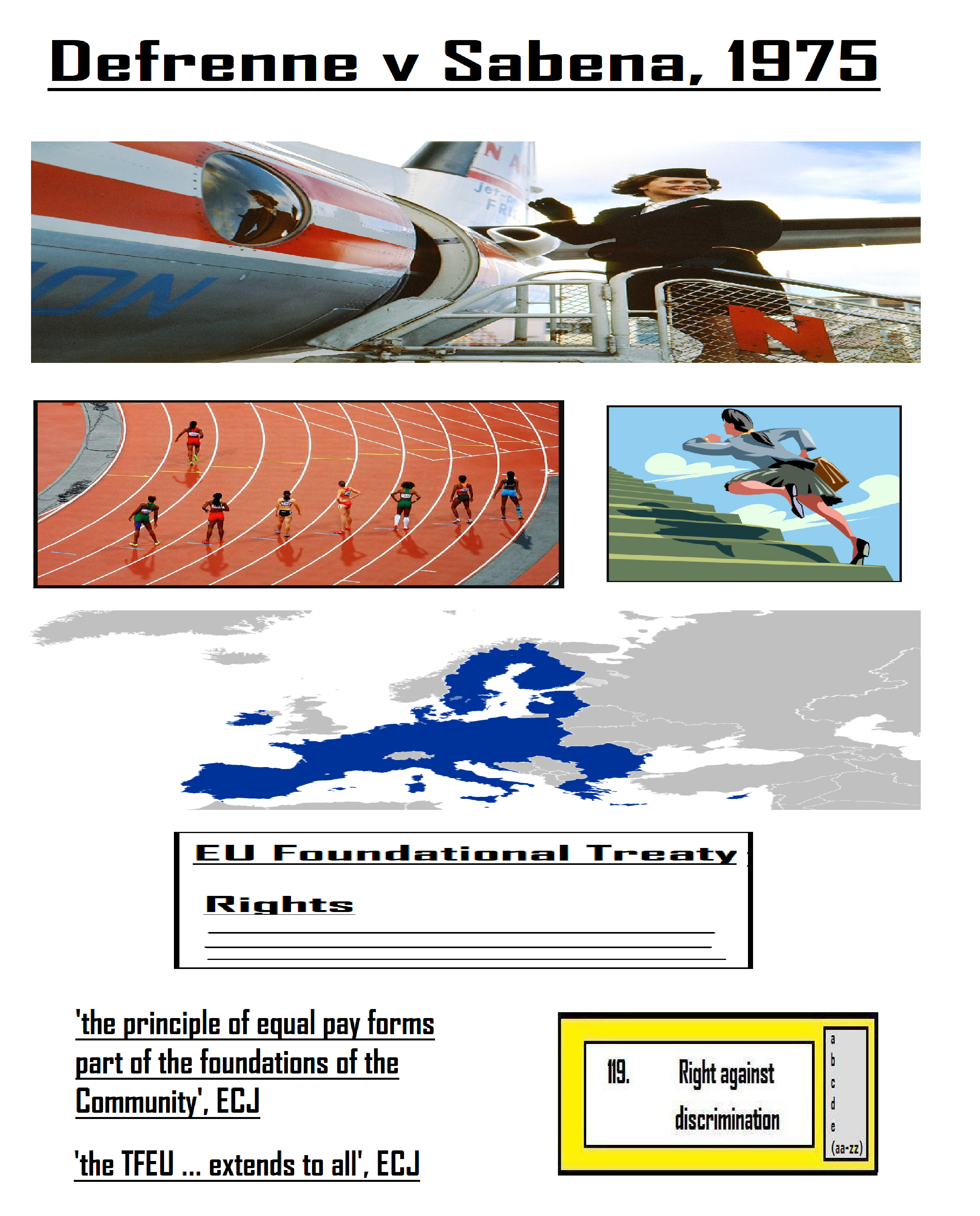Defrenne v Sabena, Case 43/75, ECJ
Citation: Defrenne v Sabena, Case 43/75, ECJ
Rule of thumb: If you are sacked for possessing a characteristic which is not related to your ability to do the job, such as your age (turning 40) is this a discrimination case? Being sacked purely for a characteristic such as age – when this is not related to the ability to do the job – is discrimination.
Facts: The facts of this case were that Mrs Defrenne was a flight attendant in Belgium with the airline Sabena. Defrenne was forced to retire at 40 years old because she was female. Men were not forced to retire at 40 years old. Defrenne turned 40, was good at her job, had a good relation with colleagues and travellers, and wanted to stay on working with the airline, but she was not allowed to do so. Defrenne challenged this with the Sabena hierarchy but all her arguments were rejected with Sabena maintaining this was company policy that had allowed them to become a successful company for many years.
Parties argued: The matter went to Court. Defrenne argued that this was unlawful discrimination where she was being forced to retire based upon her sex rather than fair and proper consideration being given to how good at her job she was. She wanted damages for this unlawful behaviour. Sabena argued that they were just providing the public with what they wanted/expected when they went on planes - women under the age of 40 serving them as they travelled. They stated that the men were doing other operational tasks away from the public eye and this was why they did not have to retire at 40. Sabena argued that this was a successful commercial strategy giving the public what they wanted in airline travel - they argued this was just the reality of society at that time. Sabena argued that the Court should not be interfering with their airline operations and the successful ways in which they make profits - if they went against what the public expected when they travelled on their planes then they could soon end up out of business. Sabena also argued further that the Treaty for the Functioning of the EU was a source of law that did not apply to them - it was only Belgian laws that applied to them.
Judgment:
The Court upheld the arguments of Defrenne. Defrenne won her case against the Sabena airline. The Court affirmed that when a country becomes a part of the EU via statute the Treaty for the Functioning of the EU is accepted into the domestic law of the country. The General EU Treaty for the functioning of the EU becomes ratified by a national state when a country enters the EU. Citizens can therefore rely on it to make legal arguments to sue not just the Government, but other citizens and companies as well. The Court also rejected Sabena's commercial arguments. They held that releasing Sabena at aged 40 was not necessary for the airline to survive or thrive commercially. They did not see clear enough evidence that keeping Defrenne on would not allow Sabena to be run properly and profitably - Sabena did not do enough to justify this approach. They Court held that Defrenne was unfairly denied commercial opportunities by being discriminated against for unfair reasons rather than based on her ability. Defrenne won her case and Sabena had to pay her damages and redundancy money for this.
'8. Article 119 pursues a double aim. 9. First, in the light of the different stages of the development of social legislation in the various member states, the aim of article 119 is to avoid a situation in which undertakings established in states which have actually implemented the principle of equal pay suffer a competitive disadvantage in intra-community competition as compared with undertakings established in states which have not yet eliminated discrimination against women workers as regards pay. 10. Secondly, this provision forms part of the social objectives of the community, which is not merely an economic union, but is at the same time intended, by common action, to ensure social progress and seek the constant improvement of the living and working conditions of their people, as is emphasized by the Preamble to the Treaty. 11. This aim is accentuated by the insertion of article 119 into the body of a charter devoted to social policy whose preliminary provision, article 117, marks, 'the need to promote improved working conditions and an improved standard of living for workers, so as to make possible their harmonization while the improvement is being maintained'. 12. This double aim, which is at once economic and social, shows that the principle of equal pay forms part of the foundations of the Community. [...] 39. The prohibition on discrimination between men and women applies not only to the action of public authorities, but also extends to all agreements which are intended to regulate paid labour collectively, as well as to contracts between individuals’.
'the principle of equal pay forms part of the foundations of the Community' ECJ
'the TFEU ... extends to all', ECJ

Warning: This is not professional legal advice. This is not professional legal education advice. Please obtain professional guidance before embarking on any legal course of action. This is just an interpretation of a Judgment by persons of legal insight & varying levels of legal specialism, experience & expertise. Please read the Judgment yourself and form your own interpretation of it with professional assistance.

